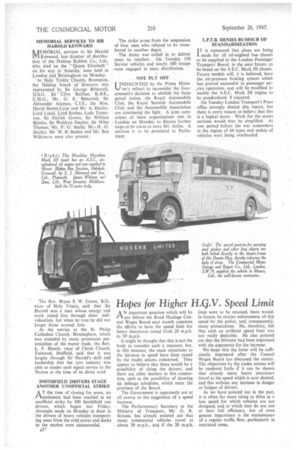Hopes for Higher H.G.V. Speed Limit A N important question which will be
Page 34

If you've noticed an error in this article please click here to report it so we can fix it.
put before the Road Haulage Central Wages Board next month concerns the efforts to have the speed limit for heavy motorcars raised from 20 m.p.h. to 30' m.p.h.
It might be thought that this is not the body to consider such a measure, but, in this instance, the main objections to the increase in speed have been raised by the trade's unions concerned. They appear to believe that there would be a possibility of tiring the drivers, and there are other matters in this connection, such as the possibility of drawing up mileage schedules, which enter the province of the Board.
The Government is apparently not at all averse to the suggestion of a speed increase.
The Parliamentary Secretary to the Ministry of Transport, Mr. G. R. Strauss, has already pointed out that many commercial vehicles travel at about 30 m.p.h., and if the 20 m.p.h.
limit were to be retained, there would, in future, be stricter enforcement of this speed by the police, and, consequently, many prosecutions. He, therefore, felt that such an artificial speed limit was not really desirable. He also pointed out that the Minister had been impressed with the arguments for the increase.
We -hope that the latter will be sufficiently impressed after the Central Wages Board has discussed the matter. The objections by the trades unions will be rendered futile if it can be shown that already many heavy motorcars travel at the speed which is now desired, and this without any increase in danger or fatigue of drivers.
As we have pointed out in the past, it is often far more tiring to drive at a low speed for which vehicles are not designed, and at which they do not run at their full efficiency, but of even greater importance is the maintenance of a regular traffic flow, particularly in restricted areas.




















































































